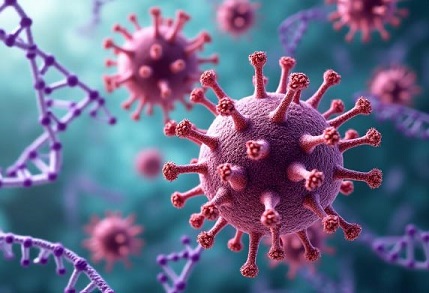Sebastian Lavoie Fact checked by:Thailand Medical News Team Sep 04, 2024 6 months, 4 weeks, 12 hours, 47 minutes ago
Medical News: As the COVID-19 pandemic continues to affect millions globally, understanding the intricate ways in which the SARS-CoV-2 virus interacts with human cells is crucial for developing effective treatments. A recent study by researchers from the University of Pittsburgh, Miami University, and the University of Central Florida in the United States has shed light on how this virus may manipulate our immune system through interactions with microRNAs (miRs), small molecules that play a significant role in regulating gene expression. This
Medical News report delves into the findings of this study and their potential implications for combating COVID-19.
 New insights into how SARS-CoV-2 hijacks host microRNAs to enhance its survival
How SARS-CoV-2 Interacts with Host MicroRNAs
New insights into how SARS-CoV-2 hijacks host microRNAs to enhance its survival
How SARS-CoV-2 Interacts with Host MicroRNAs
SARS-CoV-2, the virus responsible for COVID-19, is known for its complex RNA genome, which includes untranslated regions (UTRs) that do not code for proteins but play essential roles in viral replication and interaction with host cells. The study focused on the 3′-UTR of the SARS-CoV-2 genome, exploring how it binds with specific host miRs, namely miR-34a-5p, miR-34b-5p, and miR-760-3p.
The researchers used advanced techniques like native gel electrophoresis and steady-state fluorescence spectroscopy to demonstrate that these miRs bind to predicted sites within the SARS-CoV-2 genome’s 3′-UTR in vitro. This interaction is significant because these miRs regulate key proteins involved in the immune response, such as granulin (GRN), interleukin-6 (IL-6), and the IL-6 receptor (IL-6R). By binding to these miRs, SARS-CoV-2 may disrupt normal cellular processes, potentially contributing to the severity of COVID-19 symptoms.
The Role of MicroRNAs in Immune Regulation
MicroRNAs are small, non-coding RNA molecules that regulate gene expression by binding to messenger RNAs (mRNAs), leading to their degradation or inhibition of translation. The miRs studied in this research, miR-34a-5p, miR-34b-5p, and miR-760-3p, are known to modulate immune responses, particularly the JAK/STAT3 signaling pathway, which is crucial for controlling inflammation and immune cell proliferation.
The study suggests that by hijacking these miRs, SARS-CoV-2 could interfere with the body's immune response. For example, miR-34a-5p regulates the translation of IL-6R, a receptor involved in the pro-inflammatory response. When SARS-CoV-2 binds to miR-34a-5p, it may prevent the normal regulation of IL-6R, leading to an overactive immune response. This overactivation could contribute to the “cytokine storm,” a severe inflammatory reaction observed in some COVID-19 patients, which can lead to acute respiratory distress syndrome (ARDS) and other life-threatening conditions.
Investigating the Potential for Antiviral Therapies
Understanding these interactions opens the door to developing new antiviral therapies. The researchers also explored the use of 2′-fluoro-D-arabinonucleic acid (FANA) analogs as potential inhibitors of t
hese miR-SARS-CoV-2 interactions. FANA analogs are synthetic nucleic acid molecules designed to bind to specific RNA sequences, potentially blocking the interaction between viral RNA and host miRs.
In this study, FANA-34 and FANA-760 were tested as competitive inhibitors for the binding of miR-34a-5p, miR-34b-5p, and miR-760-3p to the SARS-CoV-2 3′-UTR. The results showed that these FANA analogs could effectively compete with the viral RNA for miR binding, suggesting a potential therapeutic strategy to disrupt the virus's ability to hijack host miRs.
Implications for Future Research and Treatment
The findings of this study are significant not only for understanding the molecular mechanisms of SARS-CoV-2 but also for developing targeted treatments. By interfering with the virus's ability to manipulate host miRs, it may be possible to reduce the severity of COVID-19 and improve patient outcomes.
However, the researchers caution that further in vivo studies are needed to confirm these findings and to explore the full potential of FANA analogs as antiviral agents. If successful, this approach could lead to new therapies that specifically target the virus-host interface, providing a new line of defense against SARS-CoV-2 and possibly other RNA viruses.
Conclusion
This study provides valuable insights into how SARS-CoV-2 may hijack host microRNAs to enhance its survival and virulence. By binding to key miRs involved in immune regulation, the virus could disrupt normal cellular processes and contribute to the severe inflammatory responses seen in some COVID-19 patients. The potential use of FANA analogs as competitive inhibitors offers a promising avenue for developing new antiviral therapies that target these interactions. As we continue to combat the COVID-19 pandemic, research like this is crucial for uncovering the complex mechanisms of the virus and finding new ways to protect human health.
The study findings were published in the peer-reviewed journal: ACS Omega.
https://pubs.acs.org/doi/10.1021/acsomega.4c01050
For the latest COVID-19 News, keep on logging to Thailand
Medical News.
Read Also:
https://www.thailandmedical.news/news/new-study-reveals-key-differences-in-mirna-expression-between-long-covid-and-recovered-patients
https://www.thailandmedical.news/news/unveiling-the-role-of-microrna-374b-in-covid-19-a-hidden-battle-inside-our-blood-vessels
